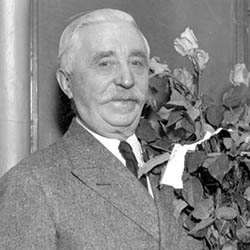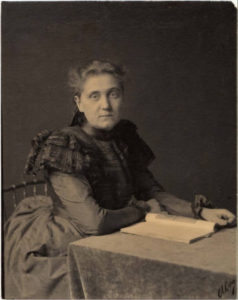
To better the lives of poor immigrants and children through Hull-House, Jane Addams often had to involve herself in the issues her residents cared about, such as child labor regulation, establishments of juvenile courts, overpopulated schools, and sanitation. To ensure that the government’s laws heard the voice of the poor, Addams often challenged the status quo, which made political leaders uneasy. Addams specifically butted heads with the corrupt alderman of the Nineteenth Ward, Johnny Powers. Born in Ireland in 1852, Powers moved to America at age 20 and settled in Chicago. He became a politician for the Democratic Party and served as alderman almost until his death in 1930. Since 1892, Hull-House fought Powers to build a new school for neighborhood children, which he opposed. Although ultimately victorious in that fight, Addams tried to get Powers to clean up the garbage in Chicago streets by collecting 1,000 complaints but failed.
This was the start of a political battle between the two. When Addams supported his 1896 opponent, Powers fought back by eliminating the garbage inspector position held by Addams and placing supervision of these activities under the Ward superintendent. This angered Addams because she had previously succeeded in surveying the streets each morning and decreasing Chicago’s litter.
Powers maintained his political influence by purchasing votes. In 1898, Addams wrote: “Last Christmas our Alderman distributed six tons of turkeys, and four or more tons of ducks and geese . . . It is easiest to reach people in the holiday mood of expansive good will, but on their side it seems natural and kindly that he should do it.” Powers often financed and appeared at funerals as well to gain support, earning him the nickname, “The Mourner.” Addams wrote: “If the Alderman seizes upon festivities for expressions of his good will, much more does he seize upon periods of sorrow. At a funeral he has double advantage of ministering a genuine craving for comfort and solace, and at the same time of assisting at an important social function” (1898). Addams argued that this made him seem like a man with virtue; however, he did not strive to help individuals. At the end of the day, the streets were unclean, schools were overcrowded, and parks were unusable.

In addition to owning two saloons, a gambling establishment, and a nice house, Powers sold city franchises and bought friends in the Council and courts. Addams demanded to know where he got his money from. “To their simple minds he gets it ‘from the rich,'” Addams wrote, “and so as long as he again gives it out to the poor, as a true Robin Hood, with open hand, they have no objections to offer” (1898).
In the 1898 elections, Addams supported Powers’s opponent, Simeon Armstrong. Because one-fifth of the voters’ jobs in the Nineteenth Ward depended on Powers’s largesse, it was a challenge for Addams to sway people’s self-interest towards a vote for Armstrong. She wrote, “If the so-called more enlightened members of the community accept public gifts from the man who buys up the Council, and the so-called less enlightened members accept individual gifts from the man who sells out the Council, we surely must take our punishment together” (1898).
Powers hit back against Addams in Chicago Tribune: “I am what my people like, and neither Hull House nor all the reformers in town can turn them against me,” he boasted. Powers claimed that Hull-House maligned the Ward, threatening, “Mark my word, a year from today there will be no such institution in the Nineteenth Ward.” Anonymous supporters of Powers sent violent letters to Addams during the election; but, others, like Professor William Hill, supported Hull-House, writing, “Those who make that institution their home have always regarded the people of the Nineteenth Ward as honest, hard-working citizens. Instead of standing on his own record, Powers is trying to shift the responsibility for neglected streets and empty houses upon somebody else” (1898).

Powers won the 1898 election. Despite Addams’s support for his opponents, Powers won re-election for the next 30 years. Though she failed to remove Powers from office, Addams learned through the experience. She realized that she needed to better understand and help her neighbors’ lives before wading in. Entering the political world interfered with her connections with Hull-House’s neighbors and made it more difficult for her to assist them and form relationships with them. After the election, she returned to helping her neighbors directly as well as working with the Chicago Bureau of Charities, which began development in 1894.
Addams’s short-lived success in keeping the Ward’s streets clean also taught Chicago residents to understand how their political leaders should work, challenging Powers and his patronage system in a more indirect way. As Ray Stannard Baker wrote in “Hull House and the Ward Boss” in 1898, “If it does not succeed, at least the residents of the ward will have had a stirring lesson in political morality, which will clear a way for success at another time.”
Sources:
“Defi to John Powers: Antis Accept the Hull House as the Campaign Issue. ” Chicago Tribune, 3 Mar. 1898, p. 7.; Jane Addams, “Why the Ward Boss Rules,” Outlook 58, no.14 (April 2, 1898): 879-82.; Kendall. “Alderman John Powers’ Home Bombed by Political Rivals.” The Chicago Crime Scenes Project, 17 May 2009, Blogger.com, http://chicagocrimescenes.blogspot.com/2009/05/alderman-john-powers-home-bombed-by.html. Accessed 21 Jun. 2017.; “Powers and Cullerton Talk.” Chicago Tribune, 6 Apr. 1898, p. 10.; Ray Stannard Baker, “Hull House and the Ward Boss,” Outlook (March 26 1898): 769-771.; Schneiderhan, Erik. The Size of Others’ Burdens: Barack Obama, Jane Addams, and the Politics of Helping Others. Stanford University Press, 2015.; Scott, Anne Firor. “Saint Jane And The Ward Boss.” American Heritage, Dec. 1960, http://www.americanheritage.com/content/saint-jane-and-ward-boss. Accessed 28 Jun. 2017.; “War on Hull House” Chicago Tribune, 2 Mar. 1898, p. 12.


Cathy Moran Hajo re-launched the Jane Addams Papers Project at Ramapo College of New Jersey’s Salameno School of Humanities and Global Studies in 2015 with a new approach to making the materials available.
Jane Addams was the Oprah of the turn-of-that-Century. Her PR and self-promotion was far ahead of its time. BTW – the Old Ward Boss id more for immigrants, the poor and helpless than all of the Hull House bologne sandwiches and presentations of Aeschyus’ Orestia could ever manage to do. https://hickeysite.blogspot.com/
Very informative article!
Thank you!
She gave immigrants culture
Johnnie De Pow in addition to holiday Turkeys and attending every wake, got them jobs to feed their families.
That garbage inspector position that Addams held, was obtained by Powers and was the only paying job that Addams ever held
He held the seat from 1888 to 1927 with a very small break. The ward was 90% Irish when he won the seat but 50% after the turn of the century with the influx of Italian immigrants